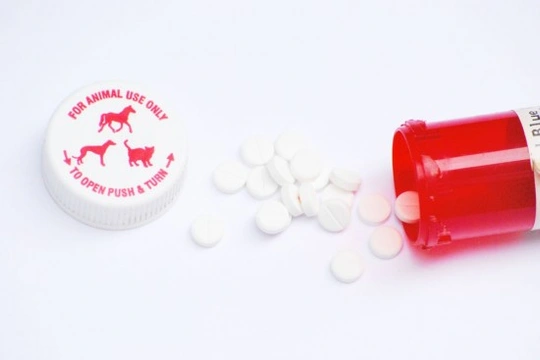
Pet health and antibiotics
Antibiotics are one of the most important tools in the veterinary surgeon’s arsenal to treat bacterial infections that do not go away on their own. Antibiotics are very widely used in both human and veterinary medicine, and are often considered as the first line go-to treatment for a wide variety of conditions. However, while we are nowadays very familiar with the use of antibiotics, they should not be considered as a miracle cure; antibiotics cannot treat every infection or condition, and have no effect whatsoever on some infections, such as viral conditions. Also, the overuse of antibiotics can lead to the bacteria that they are used to treat building up a resistance to them; not only rendering them ineffective, but potentially causing more severe infections and secondary issues.Has your pet been prescribed antibiotics, or have you ever wondered why they are used? Read on to learn more.
What exactly are antibiotics?
An antibiotic medicine is one that kills a bacteria; specifically, a bacteria that has caused an infection in the body, or is preventing a wound from healing normally. There are various different types of antibiotics, and your vet will prescribe a specific type to treat a specific problem or condition; all antibiotics are not the same, and they are not automatically interchangeable. Broad-spectrum antibiotics are used to treat a broad range of different infections, whereas other types are used for specific types of bacterium or levels of infection.
Why are antibiotics used?
Different antibiotics are used to treat a wide range of different conditions, and may also be used alongside of other treatment methods. For instance, if an animal has received an injury or a wound, antibiotics may be used alongside of the surgical or medical treatment of the injury itself, to protect it from infection. Antibiotics can only be used to treat bacterial infections; a common misconception is that any infection, such as coughs and colds that are viral in nature, will also respond to antibiotic treatment, when this is not the case. Not only will antibiotics not treat viral infections, but because they also kill some of the healthy bacteria that the body needs to fight off infections as well, they can in fact delay or prevent normal healing when used inappropriately, as they kill some of the necessary antibodies and bacteria that the body requires to remain healthy.
How to administer antibiotics
You must always administer antibiotics in exactly the way that your veterinary surgeon directs you to, as with any other medicine. Make sure that you give the correct dosage, whether this be in pill format or as a liquid that you will need to measure out with a syringe, and ensure that your pet takes all of the medicine that you are giving them! Some antibiotics must be given with food, while others must be administered on an empty stomach, so make sure you are clear on what you need to do, and double-check with your vet if you are at all unsure. Do not miss any doses, and do not give more than the prescribed dosage, and always give the medicine at around the same time each day.Finally, remember that some antibiotics can cause an allergic reaction in people, or may be absorbed by the skin, so consider wearing gloves when handling the medication and always wash your hands thoroughly afterwards.
Potential side effects of antibiotics
Generally, antibiotics are well tolerated by pets, and your vet would not prescribe them for your animal if they had cause to suspect that the risks might outweigh the benefits. It is important to make sure that your vet has a full history of your pet’s health, and is aware of any past problems, allergies or antibiotic treatments. Occasionally, some antibiotics may cause an allergic reaction in pets, so you should be aware of this and keep an eye on your pet for any signs of problems.Antibiotics might also sometimes cause vomiting or diarrhoea in pets, so let your vet know if this is the case, particularly if they may have vomited up the medication itself and so, missed a dose.
Antibiotic resistance
When antibiotics first made it into mainstream human and veterinary medicine, they were seen as something of a cure-all, and were subsequently often overused and over prescribed. Overuse of antibiotics can lead to the various bacteria that the antibiotics initially destroy becoming resistant to the treatment, meaning that the same antibiotics that once worked effectively may not successfully treat your animal another time. In the general pet (and human) population, overuse of a variety of antibiotics has caused whole strains of them to become ineffective, and hastened the development of a range of so-called ‘super bugs’ that are almost completely resistant to antibiotic treatment, such as MRSA, a condition most commonly associated with hospitals, but that can also affect pets.
Finishing the course
Very important advice that is always given with antibiotics for either people or animals, is to finish the entire course of treatment, even if your pet appears to be fully recovered part way through treatment and you want to avoid having to convince them the take their meds for any longer than necessary! It is vital to finish the complete course of antibiotics, even if your pet appears to be better, as stopping treatment too soon can mean that all of the bacteria that the antibiotics were targeting may not have been fully eradicated, and will re-emerge, possibly having developed a resistance to the antibiotics, to make your pet sick again. Always schedule a follow-up appointment with your vet after a course of antibiotics has been completed, so that your vet can confirm that your pet is cured, and treatment has been effective.



